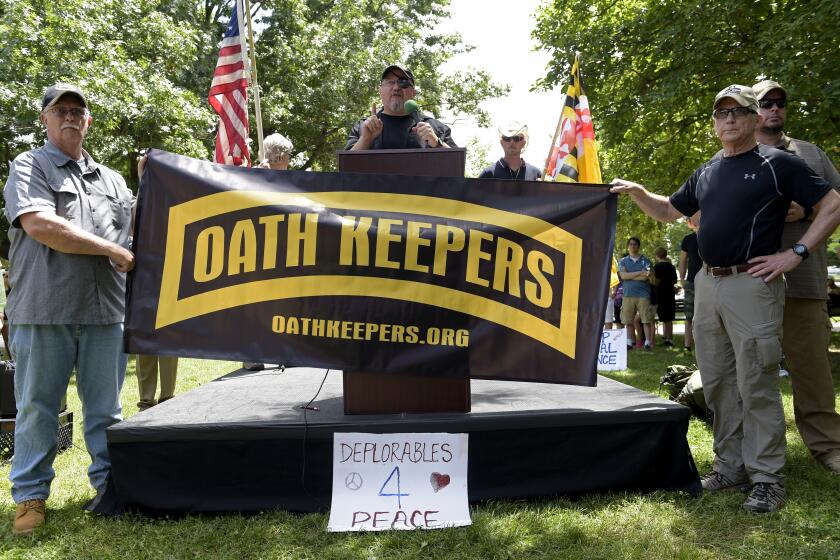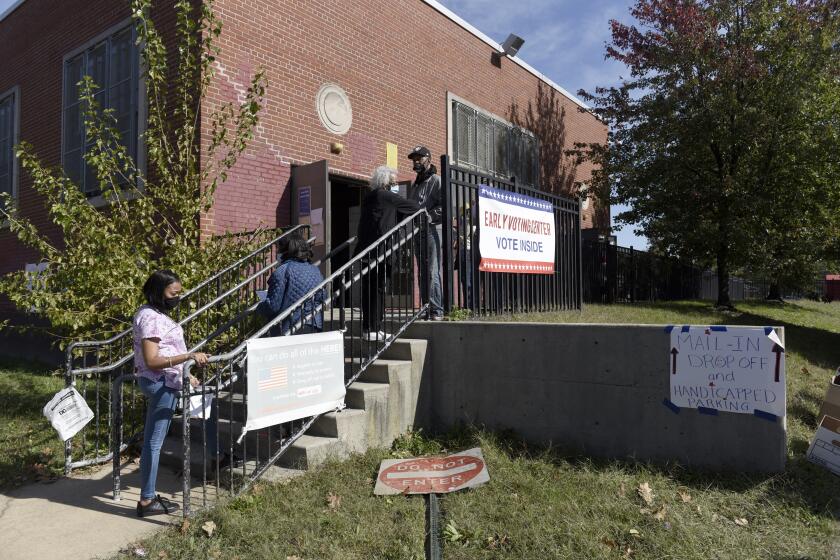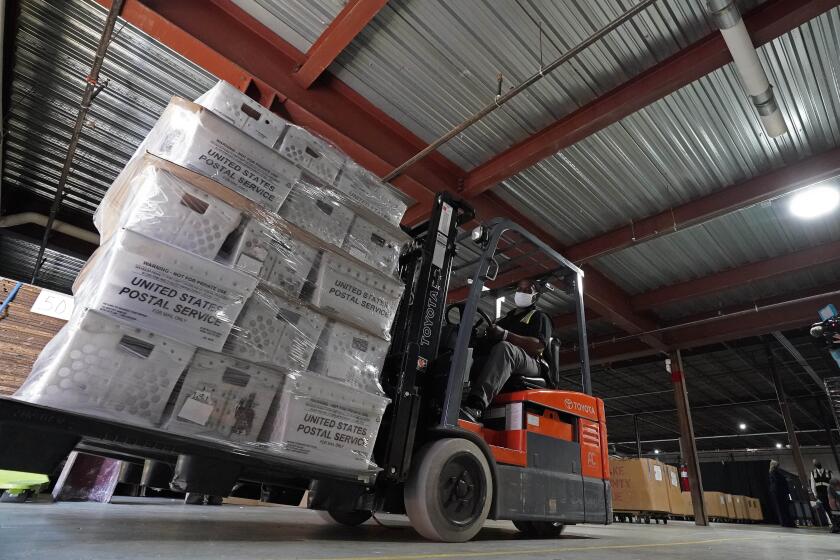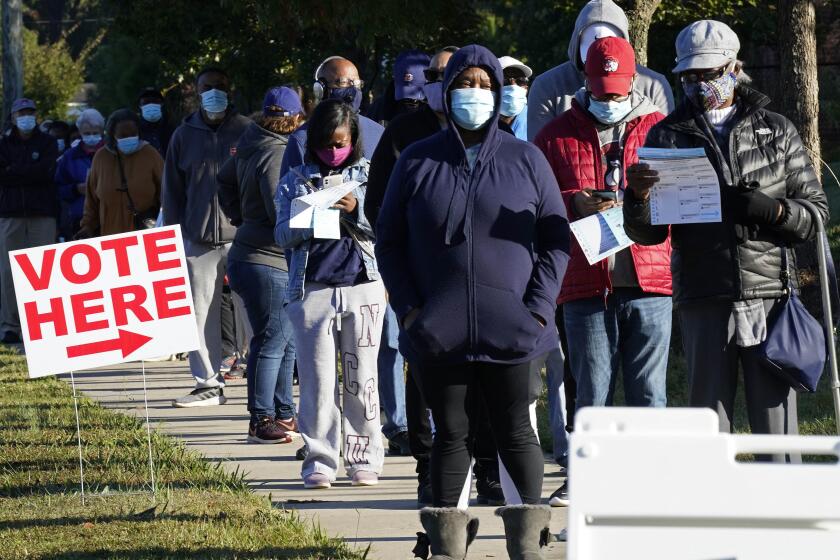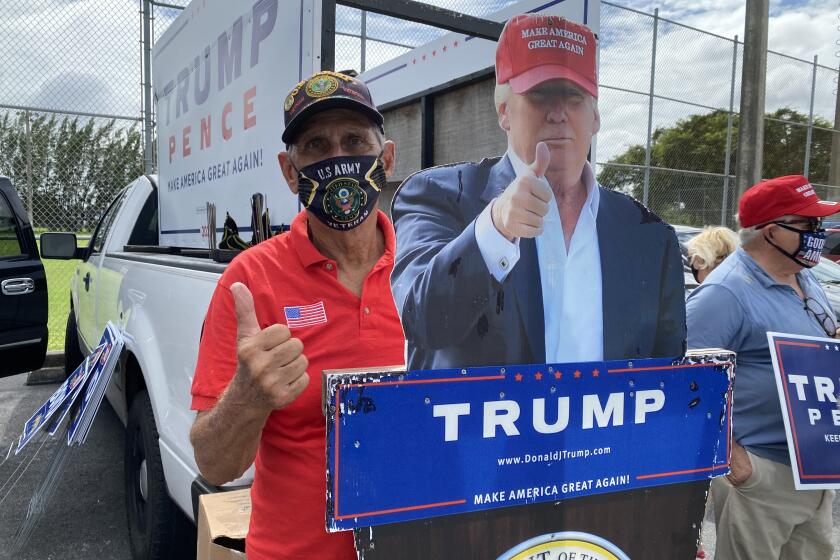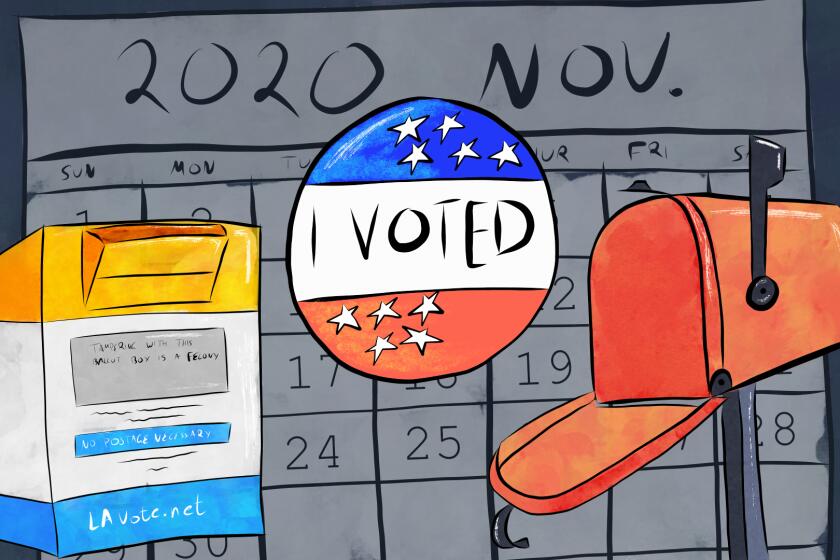‘There is a voter-suppression wing’: An ugly American tradition clouds the 2020 presidential race
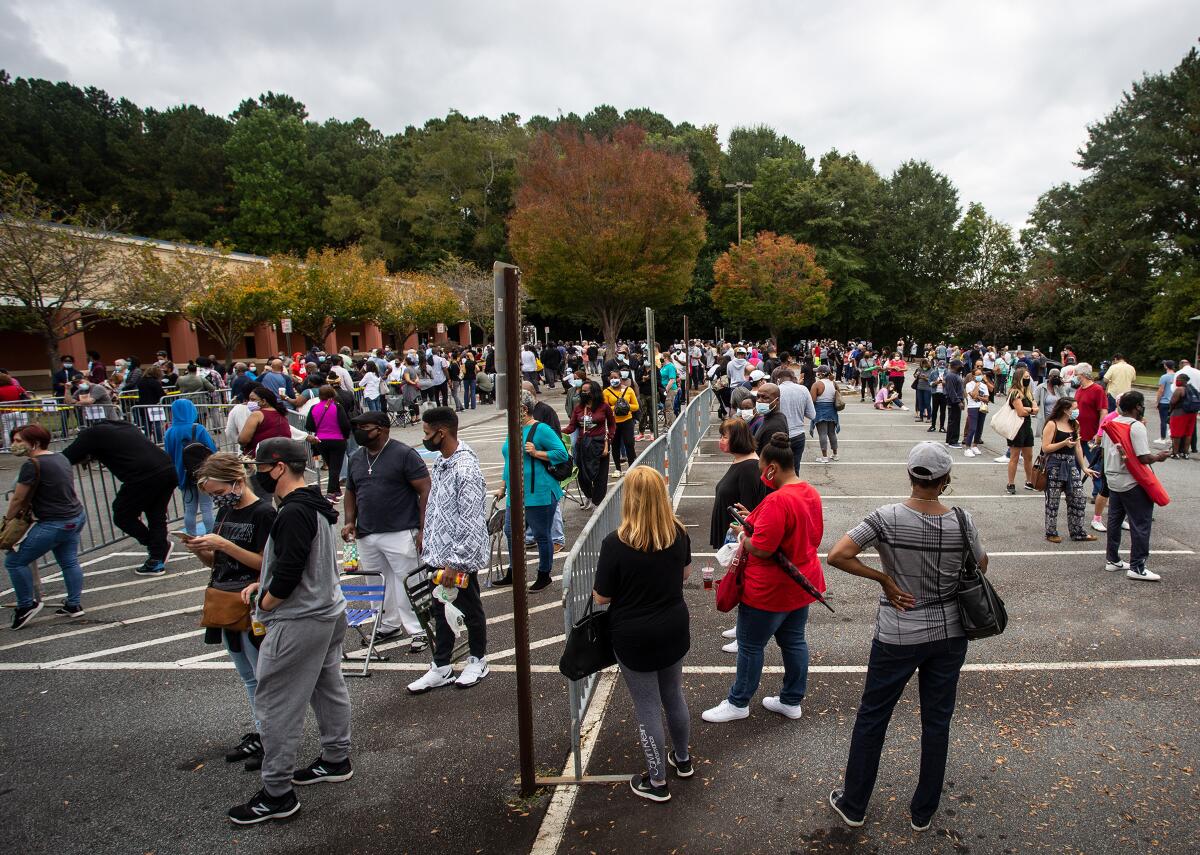
- Share via
A Memphis, Tenn., poll worker turned away people wearing Black Lives Matter T-shirts, saying they couldn’t vote. Robocalls warned thousands of Michigan residents that mail-in voting could put their personal information in the hands of debt collectors and police. In Georgia, officials cut polling places by nearly 10%, even as the number of voters surged by nearly 2 million.
The long American tradition of threatening voting access — often for Black people and Latinos — has dramatically resurfaced in 2020, this time buttressed by a record-setting wave of litigation and an embattled president whose reelection campaign is built around a strategy of sowing doubt and confusion.
Voting rights activists depict the fights against expanding voter access as a last-ditch effort by President Trump and his allies to disenfranchise citizens who tend to favor Democrats. The administration insists — despite no evidence of a widespread problem — that it must enforce restrictions to prevent voter fraud.
“We have an incredibly polarized country and we have a political party whose leader thinks it’s to the party’s advantage to make it harder for people to register to vote and to vote,” said Richard L. Hasen, a UC Irvine law professor and authority on voting. “So that is where we are.”
Trump’s efforts to tamp down turnout, particularly among voters of color, stands in stark contrast to other recent GOP presidential candidates, including John McCain and Mitt Romney, who spoke of a “big tent” party and expanding support among Black, Latino and Asian American voters.
“There are two strands in the Republican Party,” said Hasen. “There is one that has tried to be more inclusive, as a means to win elections and there is a voter-suppression wing. With Trump in office, it’s clear the voter-suppression wing is dominant right now.”
Republicans reject the notion that strict adherence to the rules is intended to quash voting. The party’s poll watchers are being trained to be “respectful and polite” and to follow the law, said Mandi Merritt, a spokeswoman for the Republican National Committee.
“The poll watching program is designed to ensure that no legally eligible voters are disenfranchised, that all votes are accurately and legally tabulated, and that voters are not confused about laws and procedures,” Merritt said. “It’s about getting more people to vote, not less.”
Although that may be the official GOP position, skeptics hear something different in Trump’s repeated insistence that he will be cheated and that his followers must watch the polls “very closely.” Critics worry the president’s false claims of fraud could lead to intimidation or violence.
“Many heard a call for voter intimidation …a fear bolstered by the actions of armed white right-wing militias that have garnered support from the president in recent months as they confronted anti-racist protesters,” the NAACP Legal Defense and Educational Fund wrote in an early October letter to Atty. Gen. William Barr and FBI Director Christopher A. Wray.
Armed right-wing groups are registering as poll watchers and planning to monitor voting places during the presidential election.
One longtime Republican voting expert has debunked the fraud claims powering his party’s efforts. Benjamin L. Ginsberg, who spent nearly four decades representing the national Republican Party and multiple GOP candidates, wrote in a Washington Post op-ed last month that a “lack of evidence” renders Trump’s claims “unsustainable.”
“The truth is that after decades of looking for illegal voting, there’s no proof of widespread fraud,” Ginsberg wrote. “At most, there are isolated incidents — by both Democrats and Republicans. Elections are not rigged. Absentee ballots use the same process as mail-in ballots — different states use different labels for the same process.”
One judge who Trump nominated to the federal bench, J. Nicholas Ranjan, recently came to a similar conclusion. In a ruling this month, Ranjan rejected Trump campaign and Republican Party attempts to limit ballot drop boxes in Pennsylvania and require signature-matching for would-be voters.
“At most,” the judge wrote, “they have pieced together a sequence of uncertain assumptions.”
With the end of a court order that barred Republicans from conducting “ballot security” operations at polling places, fears are growing of voter intimidation and suppression efforts in Democratic strongholds in November.
State and federal courts have rendered mixed verdicts in voting access cases this fall. Judges have consistently rejected allegations of fraud, but some have ruled against broader voting access or extended ballot tabulations, in order to avoid altering the rules close to election day.
Democrats and voting rights activists have won a string of victories in U.S. district courts that impose less stringent requirements for mail-in ballot signatures and witnesses, and that permit the counting of mail-in ballots postmarked by Nov. 3. But a number of those rulings subsequently were overturned by appellate courts or the U.S. Supreme Court, with Trump’s judicial appointees often casting the decisive opinions.
The result has been a series of court actions that make it harder to complete a ballot or limit the counting of ballots received after Nov. 3. Among the cases:
- The 9th Circuit Court of Appeals, overturning a lower court, refused to give Arizona voters a second chance to sign mail-in ballots. Without a reversal, unsigned mail-in ballots will now be discarded.
- Another federal appellate court also reversed a lower court and prohibited voters in Texas from clearing up signature mismatches. Voters will only learn after the election if their vote didn’t count.
- The U.S. Supreme Court stopped a South Carolina court order that said mail-in voters should not be required to have a witness sign their ballot. All mailed ballots will now have to include a witness signature, despite concern that the requirement is overly burdensome during the COVID-19 pandemic. The ruling also prohibits voters who forgot to get a witness from fixing — or “curing” — their errors.
- The Supreme Court on Wednesday overturned a lower court ruling that allowed Alabama counties to offer curbside voting, in a bid to lessen voters’ exposure to the coronavirus. In a 5-3 ruling, the court’s conservative majority blocked drive-up voting. The decision was criticized as harmful to Alabama’s Black voters during a health crisis that has disproportionately affected Black and Latino Americans.
Republicans are trying to prevent changes to allow the counting of ballots that arrive after Nov. 3. in three other battleground states — Michigan, Wisconsin and Minnesota. In Georgia, another closely contested state, an appellate court rejected a plea to allow ballots received after 7 p.m. on election day to be tallied. The court cited a past high court ruling that admonished against late electoral changes.
These states will probably decide if Joe Biden or President Trump wins the election. And their absentee ballot laws could determine when we find out.
And the litigation promised to continue every day until Nov. 3 and beyond. On Friday, the GOP went to court to try to stop the counting of mail-in votes in Nevada. The party said it needs observers to scrutinize the process, in a state where Democrats have mailed in more than two times as many ballots as Republicans.
Several rulings this year have been premised on the “Purcell principle,” a doctrine stemming from a 2006 case in which the U.S. Supreme Court suggested that federal judges typically should not alter rules close to an election, lest they confuse voters and confound the rules made by state election officials.
But in a measure of the topsy-turvy nature of the eleventh-hour rulings, the high court produced a different result in a Pennsylvania case. With the court deadlocked 4 to 4, it fell one vote shy of the majority needed to overturn a decision by the state Supreme Court. That means absentee ballots from Pennsylvania, mailed before Nov. 3, will be counted even if they are received up to three days after election day.
Democrats say extended deadlines for late-arriving ballots assure that the maximum number of legal votes are counted. Wendy R. Weiser, director of the Democracy Program at the Brennan Center for Justice, said extraordinary measures are required to allow people to vote safely during the COVID-19 pandemic. Republicans insist that the extensions break the rules and increase the chances of fraudulent votes being cast.
The most visible signs of voting obstacles emerged not in the courts but in the streets outside hundreds of early voting centers. Several states have not opened enough early voting locations to accommodate an unprecedented surge that saw more than 52.7 million Americans cast their ballots — by mail or in person — by Friday afternoon.
A wave of enthusiasm has led many Democrats to mail in or cast their ballots, but experts say the race is far from over.
Photos from Florida have shown voters lined up in the pouring rain waiting for their turn inside a polling site. In Georgia, voters have queued up for blocks, with some reporting they waited as long as 11 hours.
The Atlanta Journal-Constitution found that waits were substantially longer in poor and Black neighborhoods, where many polling places were overcrowded and understaffed in the June primary election. A review by Georgia Public Broadcasting and ProPublica found 10% fewer voting locations statewide since 2013, even as the number of younger, nonwhite voters climbed in recent years.
Even though 90 polling places were added in the metro Atlanta region in recent weeks, the ProPublica review found that the boom in new voters “outstripped the number of available polling places in both predominantly white and Black neighborhoods.”
“Voter suppression is preventing many from casting their ballots,” Martin Luther King III, the son of the civil rights icon, wrote on Twitter, including a link to voting information. Added the Atlanta resident: “Be prepared to protect your rights.”
A sense of anxiety and fear of tumultuous conclusion hung over the balloting, like no election in memory.
In Philadelphia this week, state officials chastised Trump operatives for videotaping voters while they deposited their ballots in drop boxes; Pennsylvania’s attorney general warned that the filming could intimidate voters.
In Florida, sheriff’s deputies arrested a 33-year-old white man who was yelling racial slurs and talking about terrorism outside the African-American Research Library & Cultural Center in Fort Lauderdale, an early-voting location in a largely Black neighborhood.
Biden holds a narrow lead in the nation’s perennial swing state, where early voting has started. Winning it would all but seal victory over Trump.
Wariness has been fueled by Trump, who has hesitated to say he will accept the results of the election if he loses.
After his electoral college victory in 2016, Trump declared he could only have lost the popular vote to Hillary Clinton — by nearly 3 million — because of rampant fraud. Once in office, he formed an electoral integrity commission aimed at proving his claims. (The panel disbanded after turning up no evidence of substantial irregularities.)
He now spins out a false narrative that suggests only cheating can cost him reelection. “Mail in ballots substantially increases the risk of crime and VOTER FRAUD!” Trump tweeted in April. He claims, again without evidence, that cheating is inevitable with mail-in voting. On Wednesday, the president tweeted: “Rigged Election!”
Some critics suggest that the president is merely trying to make excuses for a defeat that seems increasingly likely, or that he is trying to build a case in hopes that he can somehow force the election outcome into federal courts, where he may have the upper hand.
But Ginsberg, the veteran GOP lawyer, cautioned Republicans to steer away from a vote-stifling crusade.
“Otherwise, they risk harming the fundamental principle of our democracy: that all eligible voters must be allowed to cast their ballots,” he wrote. “If that happens, Americans will deservedly render the GOP a minority party for a long, long time.”
Times staff writer Mark Z. Barabak contributed to this report.
More to Read
Get the L.A. Times Politics newsletter
Deeply reported insights into legislation, politics and policy from Sacramento, Washington and beyond. In your inbox twice per week.
You may occasionally receive promotional content from the Los Angeles Times.

